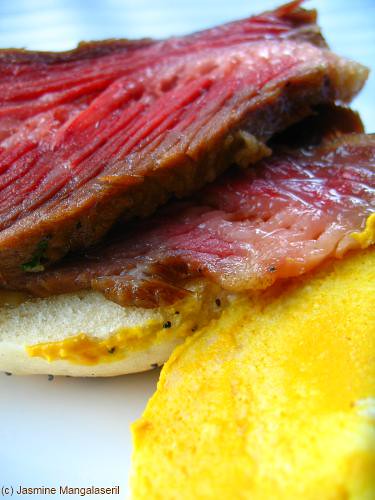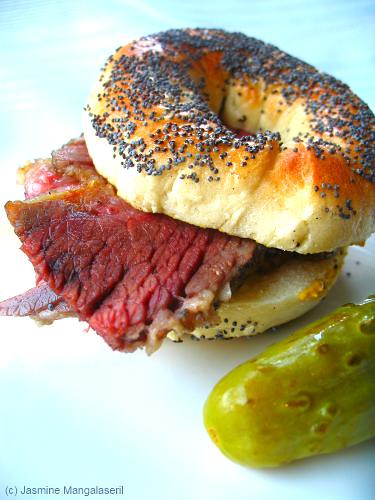
It all started off innocently enough.
Visions of home made corned beef and cabbage along with the inevitable sandwiches and hash danced in my head, in the same way that sugar plums make their obligatory appearances at Christmas.
Recipes abound online and it all looked simple: let a beef brisket soak up a spiced brine for a week or two, boil it up and then eat.
Easy, right?
Wrong.
Well...not really wrong. Just not as easy as I thought it would be.
When little, the only corned beef I knew was canned: salty, fatty, PeptoBismol coloured with a particular pre-digested texture similar to Spam. The cool part was you had to open the can with a key. Later I discovered corned beef sandwiches made of sliced cured beef. Wow. The difference was akin to contrasting 1970s polyester to pure silk.
A couple of years ago I bought a "make your own corned beef" brisket--a plastic-encased brisket, swimming in a slightly viscous, but spiced brine. Snip the end and boil. It was okay at best, chemical at worst.
This year I decided to corn (or cure) my own brisket for St. Patick's Day. I looked at a number of recipes and for the most part it seemed doable. I was starting early enough in the month that a corned beef supper shouldn't have been an issue.
It was all good, except for what turned out to be an elusive ingredient: saltpetre.
Unfortunately my favourite haunts' can't get it in. Many pharmacies either don't carry it or have had it on back order for months. (As an aside: I was more than concerned when I had to educate one pharmacist about it. Yes, I'm pulling my prescriptions from there).
Saltpetre has been used as a curing agent since the Middle Ages to keep a lovely slice of charcuterie from turning into a petri dish of nasty bacteria. It's also primarily responsible for corned beef's and salami's characteristic pink colour.
Saltpetre is used in compounding and has been used to alleviate various conditions.
Saltpetre is a nitrate. Nitrates are, from what I've read, safe to eat, but they become unsafe when they turn into nitrites which can spur cancer-causing chemicals in animals.
Saltpetre is also an ingredient in black powder and some fertilisers
Saltpetre is a legal substance in Canada and you do not need special permits to buy it (for curing meat--not sure about fertilisers and other uses).
My butcher and I had a chat about this. He told me it's difficult to find around here as are substitutes such as InstaCure No. 1 (aka Prague Powder No. 1), Pink (curing) Salt and other curing salts such as Tender Quick is just as scarce in these parts. Hrmm...
I was willing to make a brown corned beef, but I'm tenacious (read: stubborn). Up popped Canada411 and I reached for my phone. Several calls later I found a bottle, tucked in the back of a cupboard at an almost out of the way drug store. Even the pharmacist who sold it to me didn't realise he had a bottle as he's shooed off several people emptyhanded over the past few months.
It's pretty obvious. The kitchen deities were on my side. Appropriate offerings will be made, in thanks. Thank goodness they like chocolate.
I looked at a few recipes and came up with my own, scaled down to a 1kg (2lb) brisket (thank you, my darling butcher for cutting a reasonably-sized piece for me)--unlike other recipes I've seen, I wanted something that would feed four people...not 10.
It mostly went to plan. A couple of minor SNAFUs occured: the container it was in didn't let me weigh the meat down, so I turned the brisket over daily to ensure both sides were brined. I was a little worried when I took it out of its poaching liquid--the outside browned a bit, but as I sliced it, its pink interior made me smile. And...of course... I carved with the grain, as opposed to against it.
Again, the kitchen deities smiled upon me. The brisket was tender and the spice combination was absoultely delicious. I'm quite happy with this attempt and I'll do it again--I'll get a bigger container and play with the spicing a bit. I may even see how long it's safe to brine the meat without using saltpetre (apart from freezing the meat in the brine)--there's nothing wrong with brown corned beef. Until then, here's the recipe I used.
 Corned beef
Corned beefServes 4-6
Adapted from recipes by Lobel, Alton Brown and about.com
Brining time: 2 weeks
Cooking time approximtely 3hrs
Ingredients
For the brine:
0.5tsp whole black peppercorn
0.5tsp mustard seed (black or yellow--I used black)
0.5tsp whole coriander seed
6 juniper berries
4 allspice berries
4 whole cloves
2 whole cardamom pods
2.5cm (1") cinnamon stick
120g (0.5c) kosher salt
65g (0.33c) brown sugar
1 bay leaf
0.5tsp chilli flakes
0.5tsp ground ginger
0.25tsp ground nutmeg
17g (1Tbsp) saltpetre
1.25L (5c) water
1kg (2lbs) beef brisket
To cook the brisket:
water
1 onion, quartered
1 carrot chopped into large chunks
1 celery rib, chopped into large chunks
2 garlic cloves, smashed
Method
To brine the beef:
Dry toast the peppercorns, mustard seed and coriander seed in a hot skillet until the mustard seeds begin to splutter and pop. Tip onto a cutting board and juniper, allspice, cloves and cinnamon and lightly crush with a rolling pin or pot bottom (or simply lightly crush the lot with a mortar and pestle).
Combine crushed spices with salt, sugar, bay leaf, chilli flakes, ginger, nutmeg, saltpetre and water. Bring to a boil and then turn down the heat to a simmer, stirring occasionally until the salt and sugar fully dissolve. Remove from heat cool and room temp. Pop into the fridge to cool thoroughly.
Pour into a container or a zippy bag that's big enough to hold all the brine and the brisket. Submerge the brisket in the brine. If the brisket floats, weigh it down with a saucer or quarterplate so the meat is completed submerged.
Refridgerate for 14 days, checking daily to ensure the meat is totally submerged.
To cook the brisket:
Remove the meat from the brine (keep the brine!) and rinse it thoroughly in several water changes.
Strain the brine, saving the pods, seeds and spices.
Place the brisket in a pot that's just large enough to fit it. Add the brine's spices, chopped carrots, celery, onion and garlic. Cover with about 5cm (2") water. Give it a stir. Bring the water to a boil and then turn the hob down and let the pot simmer for 2.5-3 hours.
To check for doneness, insert a sharp, thin-bladed knife or a carving knife into the thickest part of the meat. If it inserts easily, then the brisket is done.
Carefully remove the meat and let sit for about 15 minutes before carving. Serve thin slices, cutting across the grain.
cheers!
jasmine

4 comments:
You're bringing back memories of my doing this for the first time also last year. I remember the issue with saltpetre too. I never posted it thinking I'd be smart and do it this year -- but no. Anyway, what we've learned about keeping brined meat or poultry from floating is to put it in a bag (or bags, depending on thickness) and expelling all the air. No need to turn as much. Glad your corned brisket turned out! I commend your diligence, btw!
wow I am really impressed! It looks so wonderful. All your hard work paid off!
Hello all-- thanks for the notes :)
Kelly--Thanks for the great tip--something to think about next time I do this (or other long-term brining).
Tina--It's definitely worth the effort. So much nicer than the tins and the flavour seems less "industrial" than from the deli packets.
j
Good recipe. But you are supposed to carve against the grain.
Post a Comment